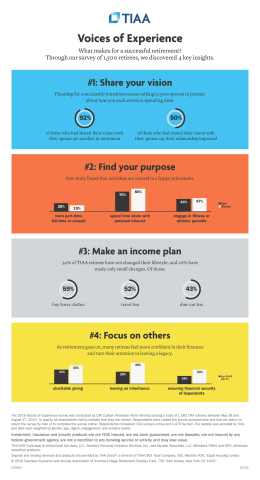NEW YORK--(BUSINESS WIRE)--Getting ready for the emotional transition to retirement is as crucial for success in later life as sound financial planning, according to a study of more than 1,500 retirees by TIAA, a leading financial services provider serving the nonprofit sector.
The results show that, in addition to solid financial planning, preparing for a wide range of non-financial challenges can help secure a happier retirement. Chief among these are preparing for the changing nature of relationships, staying active and practicing healthy habits.
The 2016 Voices of Experience survey is a follow-up to TIAA’s landmark study with the same name, which surveyed more than 1,500 TIAA retirees in 1982. Like the earlier research, the new study provides insights into evolving attitudes toward life in retirement.
Stronger Bonds in Relationships
An overwhelming majority of retirees’ relationships with their family and friends remained steady -- or grew stronger -- in retirement. Ninety-seven percent say their relationships with family members have remained steady or improved, 96 percent report the same for their relationships with their children, and 93 percent say the same about their friendships.
Contrary to the stereotype of retired couples struggling with increased time together, 95 percent of respondents report that the ties with their spouse or partner stayed the same or improved. Having a similar outlook on retirement may be why: 85 percent of those who had an easy transition to retirement shared a vision with their partner, compared to just 53 percent of those who had a difficult transition.
“Like any major life change, retirement can have a significant impact on relationships. Our research shows that taking the time and care to plan for this transition – both emotionally and financially – helps to set up retirement success,” said Roger W. Ferguson, Jr., president and CEO at TIAA. “For couples, going through the planning process hand in hand helps both partners more easily adapt to retirement.”
More Active and More Satisfied
Staying active is an important characteristic shared by successful retirees: Among those who participate in 10 or more activities, 76 percent are very satisfied with their life in retirement, compared to just 52 percent of those who participate in only 1-4 activities. However, the study found that activity levels slow considerably after age 80, marking a time that retirees might consider planning for another transition similar to their early years in retirement.
Another important consideration is that many of the activities retirees enjoy are solo: The No. 1 way people spend time in retirement is alone, pursuing personal interests and hobbies (75 percent). This represents a big shift from working life -- and is an important shift for retirees to prepare for psychologically.
“Staying involved is a big factor in a satisfying retirement,” Ferguson said. “As part of a holistic plan, retirees should prepare for ways to stay engaged with their friends and communities at all stages of retirement.”
Enough Security To Give Back
The majority of survey respondents (86 percent) report that they are satisfied with their financial health in retirement. More than half (54 percent) have not needed to make any financial adjustments to their lifestyle in retirement, and another 20 percent have only made minor changes, such as buying fewer clothes or eating out less frequently.
This sense of security can give retirees the comfort level they need to give back to their communities – 65 percent regularly spend time volunteering or working with charitable organizations. Only 17 percent of respondents report currently working for pay every week, and only 5 percent of those who work or have worked during retirement do so purely for financial reasons. Eighteen percent who work or have worked after retiring do so for non-financial reasons, such as interest or enjoyment; another 19 percent work for a combination of financial and non-financial reasons.
As retirement goes on, people tend to focus even more on creating success for others, through charitable giving and leaving a legacy:
- 33 percent of TIAA retirees age 66-69 prioritize charitable giving, but that figure increases to 43 percent among retirees age 80 or older.
- Leaving an inheritance is a priority among 28 percent of the younger group, rising to 49 percent among the older group.
- 18 percent of the former want to ensure financial security for their dependents, increasing to 33 percent among the latter.
“Successful retirement planning can allow retirees to commit more of their finances and their time to others. As people better understand their own financial needs, they become more comfortable with what they can do to help family members, like grandchildren, or give to charities,” Ferguson said.
Gender Differences in Retirement
Whether they are giving back or participating in other activities, men and women spend their time in retirement in strikingly different ways. Retired women are more likely to engage with others and give back to their communities by volunteering (58 percent of women versus 42 percent of men) or caring for family members (43 percent to 26 percent). Men, on the other hand, are more likely to pursue active personal hobbies, like favorite sports (38 percent of men versus 18 percent of women), or work (28 percent versus 19 percent).
And retired men were more focused from the outset on their finances. They were more likely to::
- Begin planning before age 30 (22 percent of men versus 12 percent of women).
- Find the transition to retirement easy (77 percent versus 69 percent).
- Be very satisfied with their financial health (58 percent versus 46 percent).
And retired women are almost twice as likely to say that their biggest concern in retirement is running out of money – 29 percent, compared to 15 percent of men.
“Preparing for retirement is a journey, and every person’s journey looks a little different. Some may need to focus more on financial readiness, while others need to spend more time examining the emotional transitions,” Ferguson said. “Fortunately, there are many resources that people can use to help them plan most effectively to meet their own needs.”
Preparing for the Realities of Aging
The survey reflects an overall positive experience in retirement: 82 percent of retired TIAA plan participants say they feel satisfied with their retirement preparations. Ninety percent are satisfied with their emotional health as well. However, the realities of aging still keep many up at night. Fifty-three percent worry about becoming a burden to others, 46 percent worry about a spouse or partner dying, and a significant minority are concerned with mental/cognitive deterioration (44 percent) and mobility issues (43 percent).
“It’s natural to have concerns about aging, but careful financial planning can go a long way in alleviating those fears. Healthcare savings accounts, long-term care insurance, and a steady source of income for life can all help individuals reduce anxiety and feel more secure as they enter retirement,” Ferguson said.
Employers can help their employees plan for a successful retirement by offering resources for many aspects of financial planning. Interactive planning tools and personal support can help employees figure out how to reach their retirement goals. Providing access to lifetime income options such as annuities also can help people develop a comprehensive financial plan for their retirement years.
“Employers can be good resources for employees to achieve the successful, happy retirement they want. They can help by offering tailored support that takes into account the emotional and physical transitions that come with retirement, as well as the specific needs among retirees of different ages and genders,” Ferguson said.
Visit our website for more information about the 2016 TIAA Voices of Experience survey, or download an infographic, fact sheet, and full report.
About TIAA
TIAA (TIAA.org) is a unique financial partner. With an award-winning1 track record for consistent investment performance, TIAA is the leading provider of financial services in the academic, research, medical, cultural and government fields. TIAA has $915 billion in assets under management2 (as of 9/30/2016) and offers a wide range of financial solutions, including investing, banking, advice and guidance, and retirement services.
The 2016 Voices of Experience survey was conducted by GfK Custom Research North America among a total of 1,583 TIAA retirees between May 28 and August 27, 2015. To qualify, all respondents had to indicate that they are retired. Respondents were mailed the survey questionnaire and had the option to return the survey by mail or to complete the survey online. Respondents completed 104 surveys online and 1,479 by mail. The sample was provided by TIAA, and data were weighted by gender, age, region, engagement, and industry sector.
1The Thomson Reuters Lipper Large Fund Award is given to the group with the lowest average decile ranking of three years’ Consistent Return for eligible funds over the three-year period ended 11/30/12, 11/30/13, 11/30/14 and 11/30/15, respectively. TIAA was ranked among 36 fund companies in 2012, 48 fund companies in 2013 and 2014, and 37 fund companies in 2015 with at least five equity, five bond or three mixed-asset portfolios. Classification averages are calculated with all eligible share classes for each eligible classification. The calculation periods extend over 36, 60 and 120 months. The highest Lipper Leader for Consistent Return (Effective Return) value within each eligible classification determines the fund classification winner over three, five or 10 years. A detailed awards methodology can be found at excellence.thomsonreuters.com/award/lipper. For current performance and rankings, please visit the Research and Performance section on TIAA.org. Past performance does not guarantee future results.
2 Based on assets under management across Nuveen Investments affiliates and TIAA investment management teams
You should consider the investment objectives, risks, charges and expenses carefully before investing. Please call 877-518-9161 for current product and fund prospectuses that contain this and other information. Please read the prospectuses carefully before investing.
Investment, insurance and annuity products are not FDIC insured, are not bank guaranteed, are not deposits, are not insured by any federal government agency, are not a condition to any banking service or activity, and may lose value.
TIAA-CREF Individual & Institutional Services, LLC, Teachers Personal Investors Services, Inc., and Nuveen Securities, LLC, Members FINRA and SIPC, distribute securities products.
Deposit and lending services and products are provided by TIAA Direct®, a division of TIAA-CREF Trust Company, FSB. Member FDIC. Equal Housing Lender.
© 2016 Teachers Insurance and Annuity Association of America-College Retirement Equities Fund, 730 Third Avenue, New York, NY 10017
C34588




